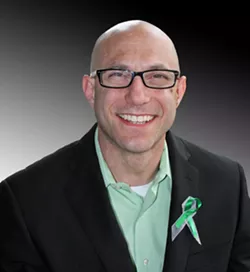It's been more than five years since Jeremy Richman and his wife Jennifer Hensel lost their 6-year-old daughter, Avielle Richman, in the shooting at Sandy Hook Elementary School in Newtown, Connecticut.
Ever
"My wife and I are scientists," Richman tells the Inlander. "When we were faced with this infinite heartbreak, we decided to take a scientific approach to see if we could fund studies understanding the risk factors and changes in the brain that leads to violence."
Richman will be in Spokane on Wednesday to speak at Gonzaga about how society can work to understand violence. Richman was invited by Our Kids: Our Business, a network of dozens of agencies looking out for the well-being of children, as part of Child Abuse Prevention Month.
Recent school shootings have sparked a national conversation about gun control and mental health. What's missing from that national conversation is a focus on understanding the brain science leading to what Richman calls "abnormal" behaviors that are acts of violence. On one side, you have people advocating for gun control. On the other hand, he says, you have people saying "guns don't kill people, people kill people," advocating for mental health support.
Richman says that saying should be finished: People kill people, with guns. Both mental health and gun control should be looked at, he says.
"We need to get away from black and white thinking," he says.
Nobody should ignore how firearms are "lethal forms of destruction," Richman says. At the same time, mental illnesses need to be better understood before they potentially manifest in violent ways.
Richman says there should be a "line of lethality" when determining access to firearms. The more lethal the weapon, he says, the more restrictions there should be based on a brain assessment and reasons the person would need that weapon. And then law enforcement needs to make sure those requirements are enforced, Richman says.
But Sandy Hook, where 20 young children and six educators were killed in 2012, and other high-profile school shootings can overshadow the fact that violence occurs on street corners every day, Richman says.
"It's not just school violence," he says. "It's everywhere."
Understanding the brain is key. Richman says it's just another organ in the body, but one we know very little about when it comes to committing violence, he says.
"I think we would all agree that somebody that's capable of killing a bunch of first-graders or raping somebody isn't behaving normally. That's abnormal," Richman says.
Some risk factors have been scientifically established to lead to violence, Richman says. He will cover those risk factors and explain the nature of the brain and violent behaviors during his time at Gonzaga. He'll talk about factors preventing violence, neuroplasticity and trauma-informed care.
Neuroscience can explain some of the factors leading to violence, but Richman says much more research needs to be done. The Avielle Foundation aims to do that, and it's completed a couple pilot studies, but it's not enough, Richman admits.
"It's unchartered territory, in terms of studying violence as a disease," Richman says. "Our foundation is doing it, but we're chump change in terms of what needs to be put in."
Making Our kids: Our business Annual Reception • Gonzaga University's Cataldo Hall • Wed., April 18, doors open at 5:30 pm • $10 • Register at Eventbrite.com (search 'Our kids: Our business")

